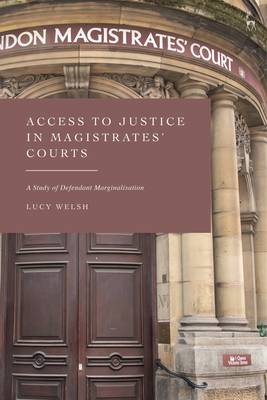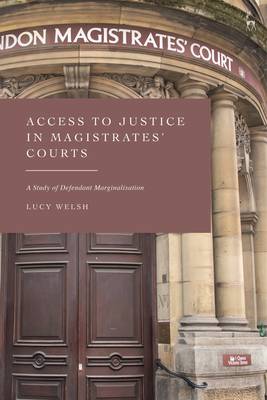
- Afhalen na 1 uur in een winkel met voorraad
- Gratis thuislevering in België vanaf € 30
- Ruim aanbod met 7 miljoen producten
- Afhalen na 1 uur in een winkel met voorraad
- Gratis thuislevering in België vanaf € 30
- Ruim aanbod met 7 miljoen producten
Zoeken
Access to Justice in Magistrates' Courts
A Study of Defendant Marginalisation
Lucy Welsh
Hardcover | Engels
€ 220,45
+ 440 punten
Uitvoering
Omschrijving
This book examines access to justice in summary criminal proceedings by considering the ability of defendants to play an active and effective role in the process.
'Access to justice' refers not just to the availability of legally aided representation, but also to the ability of defendants to understand and effectively participate in summary criminal proceedings more generally. It remains a vital principle of justice that justice should not only be done, but should also be seen to be done by all participants in the process.
The book is based on socio-legal research. The study is ethnographic, based on observation conducted in four magistrates' courts in South East England and interviews with both defence lawyers and Crown prosecutors.
Setting out an argument that defendants have always been marginalised through particular features of magistrates' court proceedings (such as courtroom layout and patterns of behaviour among the professional workgroups in court), the political climate in relation to defendants and access to justice that has persisted since 2010 has further undermined the ability of defendants to play an active role in the process.
Ultimately, this book argues that recent governments have demanded ever more efficiency and cost saving in criminal justice. In that context, principles that contribute to access to justice for defendants have been seriously undermined.
'Access to justice' refers not just to the availability of legally aided representation, but also to the ability of defendants to understand and effectively participate in summary criminal proceedings more generally. It remains a vital principle of justice that justice should not only be done, but should also be seen to be done by all participants in the process.
The book is based on socio-legal research. The study is ethnographic, based on observation conducted in four magistrates' courts in South East England and interviews with both defence lawyers and Crown prosecutors.
Setting out an argument that defendants have always been marginalised through particular features of magistrates' court proceedings (such as courtroom layout and patterns of behaviour among the professional workgroups in court), the political climate in relation to defendants and access to justice that has persisted since 2010 has further undermined the ability of defendants to play an active role in the process.
Ultimately, this book argues that recent governments have demanded ever more efficiency and cost saving in criminal justice. In that context, principles that contribute to access to justice for defendants have been seriously undermined.
Specificaties
Betrokkenen
- Auteur(s):
- Uitgeverij:
Inhoud
- Aantal bladzijden:
- 208
- Taal:
- Engels
Eigenschappen
- Productcode (EAN):
- 9781509937837
- Verschijningsdatum:
- 27/01/2022
- Uitvoering:
- Hardcover
- Formaat:
- Genaaid
- Afmetingen:
- 156 mm x 234 mm
- Gewicht:
- 462 g

Alleen bij Standaard Boekhandel
+ 440 punten op je klantenkaart van Standaard Boekhandel
Beoordelingen
We publiceren alleen reviews die voldoen aan de voorwaarden voor reviews. Bekijk onze voorwaarden voor reviews.








